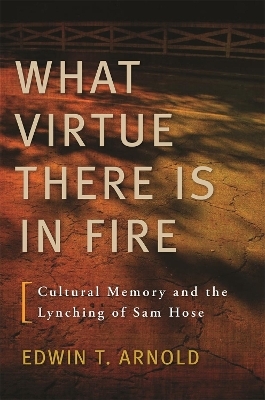
What Virtue There Is In Fire
Cultural Memory and the Lynching of Sam Hose
Seiten
2012
University of Georgia Press (Verlag)
978-0-8203-4064-7 (ISBN)
University of Georgia Press (Verlag)
978-0-8203-4064-7 (ISBN)
- Lieferbar (Termin unbekannt)
- Versandkostenfrei
- Auch auf Rechnung
- Artikel merken
The 1899 lynching of Sam Hose in Newnan, Georgia, was one of the most gruesome events in US history. Hose was accused of killing Alfred Cranford, a white farmer, and raping his wife. The author, troubled by the fact that this horrific chain of events has been largely shut out of public memory, offers an in-depth examination of the lynching.
The 1899 lynching of Sam Hose in Newnan, Georgia, was one of the earliest and most gruesome events in a tragic chapter of U.S. history. Hose was a black laborer accused of killing Alfred Cranford, a white farmer, and raping his wife. The national media closely followed the manhunt and Hose’s capture. An armed mob intercepted Hose’s Atlanta-bound train and took the prisoner back to Newnan. There, in front of a large gathering on a Sunday afternoon, Hose was mutilated and set on fire. His body was dismembered and pieces of it were kept by souvenir hunters.
Born and raised twenty miles from Newnan, Edwin T. Arnold was troubled and fascinated by the fact that this horrific chain of events had been largely shut out of local public memory. In ""What Virtue There Is in Fire,"" Arnold offers the first in-depth examination of the lynching of Sam Hose.
The 1899 lynching of Sam Hose in Newnan, Georgia, was one of the earliest and most gruesome events in a tragic chapter of U.S. history. Hose was a black laborer accused of killing Alfred Cranford, a white farmer, and raping his wife. The national media closely followed the manhunt and Hose’s capture. An armed mob intercepted Hose’s Atlanta-bound train and took the prisoner back to Newnan. There, in front of a large gathering on a Sunday afternoon, Hose was mutilated and set on fire. His body was dismembered and pieces of it were kept by souvenir hunters.
Born and raised twenty miles from Newnan, Edwin T. Arnold was troubled and fascinated by the fact that this horrific chain of events had been largely shut out of local public memory. In ""What Virtue There Is in Fire,"" Arnold offers the first in-depth examination of the lynching of Sam Hose.
Edwin T. Arnold is professor emeritus of English at Appalachian State University. He is the author or editor of nine books on southern literature and culture.
| Verlagsort | Georgia |
|---|---|
| Sprache | englisch |
| Gewicht | 370 g |
| Themenwelt | Geschichte ► Allgemeine Geschichte ► Neuzeit (bis 1918) |
| Geisteswissenschaften ► Geschichte ► Regional- / Ländergeschichte | |
| Geschichte ► Teilgebiete der Geschichte ► Kulturgeschichte | |
| Recht / Steuern ► Strafrecht ► Kriminologie | |
| Sozialwissenschaften ► Ethnologie | |
| Sozialwissenschaften ► Soziologie | |
| ISBN-10 | 0-8203-4064-2 / 0820340642 |
| ISBN-13 | 978-0-8203-4064-7 / 9780820340647 |
| Zustand | Neuware |
| Haben Sie eine Frage zum Produkt? |
Mehr entdecken
aus dem Bereich
aus dem Bereich
Giordano Bruno - ein ketzerisches Leben
Buch | Hardcover (2024)
C.H.Beck (Verlag)
CHF 41,85
das dramatische 16. Jahrhundert
Buch | Hardcover (2024)
Rowohlt Berlin (Verlag)
CHF 47,60


